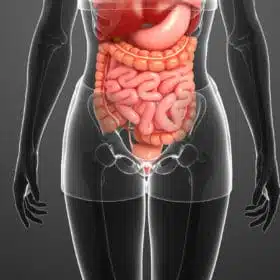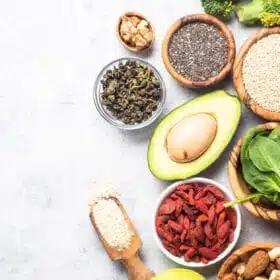What would the world of sport be without myths and legends? Apparent wisdom that seems to have dogmatically burned itself into the memory of many exercisers and does not allow for any questioning of facts. To help you distinguish between fact and fiction, we have compiled 26 of the best-known myths from the world of fitness in this article.
Myth 1 - If you eat after 6 pm, you will gain weight.
Whether you gain weight or not depends solely on your energy balance, the time of day has nothing to do with it. However, it is true that you should not eat any more hard-to-digest foods shortly before going to bed, as this reduces the quality of your sleep.
Myth 2 - Women become hulks through strength training.
This myth has no physiological basis, as women do not have the hormonal environment to naturally build up anywhere near as much muscle mass as the average man. Women should therefore definitely do strength training, as this is the only way to shape the body sustainably.
Myth 3 - You have to be particularly flexible to do yoga.
Quite the opposite, because practicing yoga exercises is what makes you more flexible in the first place. Of course, it is not possible for a complete beginner to assume the most demanding positions, but a strength athlete doesn't start with 100 kilogram squats either, does he?
Myth 4 - Crunches for washboard abs.
Of course, crunches serve to build up the abdominal muscles, but this does not mean that you will get a washboard stomach just by doing them, as this is mainly created in the kitchen by reducing your body fat percentage through a calorie-reduced diet. Otherwise, the muscles will remain invisible despite thousands of crunches.
Myth 5 - Drinking during exercise causes cramps.
As your body loses fluids and important electrolytes during a workout, it is highly recommended that you always drink enough to maintain your performance. The fact that drinking water leads to cramps definitely belongs in the realm of legend.
Myth 6 - Chocolate bars before training push you for the workout.
The sugar contained in chocolate bars and other sweets does indeed give you a strong energy boost for a very short time due to the rapid rise in insulin levels. However, the flip side of the coin is that the insulin level quickly drops again and you fall into an energy hole, causing your performance to drop rapidly. It is better to eat long-chain carbohydrates a few hours before training.
Myth 7 - Cardio training is the only way to lose fat.
Although cardio training is undoubtedly healthy for your cardiovascular system and helps you to burn extra calories, the only decisive factor for fat loss is the calorie balance. Only if this is negative, i.e. you consume more than you take in, will body fat be reduced.
Myth 8 - Training on machines is safer than training with free weights.
A machine supports you in the execution of the movement and of course also has a right to exist in weight training, but this form of training neglects the secondary auxiliary muscles, which increases your susceptibility to injury. When training with free weights, on the other hand, these muscles are also trained. If you pay attention to proper technique during barbell training, it is no more injury-prone than machine training.
Myth 9 - You can lose fat in a targeted way.
Wrong! The size of the energy deficit determines the amount of body fat that is broken down, and your genetics determine where and in what order this happens.
Myth 10 - Training is most effective in the morning.
You alone decide the best time to go to the gym or go for a jog in the park. There is no such thing as a universal optimal training time.
Myth 11 - No pain, no gain.
Although this is often claimed, the severity of muscle soreness after a workout is not an indicator of the quality of a training session. Be aware that muscle soreness is simply a muscle injury that merely extends the recovery time. So not having sore muscles is not the same as treading water.
Myth 12 - Warming up is unnecessary.
Warming up before training is essential for several reasons. Firstly, warming up prepares your muscles for the workout, making them more elastic and therefore less susceptible to injury. And secondly, the warm-up ensures that a large proportion of the existing muscle fibers are brought up to temperature in advance of the work sets, which results in maximum strength development.
Myth 13 - Cooling down is a waste of time.
The cool-down is just as important as the warm-up to give your body the opportunity to cool down slowly and normalize metabolic processes. If this happens abruptly, it can even lead to heart problems.
Myth 14 - Fat-free diets are ideal for your health.
As with everything in life, it depends on the definition, because trans fats, such as those found in fast food, definitely do not belong in a healthy diet. On the other hand, the human body needs a variety of different fats in order to produce hormones and keep the metabolism going. Completely fat-free diets are therefore counterproductive for your health.
Myth 15 - Muscle turns to fat when you stop exercising.
This is physiologically impossible. By stopping regular training and the resulting lack of growth and maintenance stimuli, muscles are simply broken down because the body wants to get rid of the energy wasters that are no longer needed.
Myth 16 - Fat can be converted into muscle mass through training.
This is just as physiologically impossible as the conversion of muscle mass into fat.
Myth 17 - Protein equals protein.
There are different types of proteins that enter the bloodstream and therefore the muscles at different rates. Accordingly, each form of protein has its own area of application and raison d'être.
Myth 18 - If you didn't train when you were young, it's too late now!
No, it's never too late to strengthen your body. Strength athletes are like good wine - the older the better.
Myth 19 - Exercising during the menopause causes hot flushes.
Another myth that is not based on a kernel of truth. In fact, exercise can help you to keep your body healthy during the menopause and ensure a balanced hormone level, for example.
Myth 20 - Low-fat foods are low in calories.
Although this is true in some cases, it is usually the case that the missing fat is replaced by sugar as a flavor carrier. You should therefore read the labels on the food you buy very carefully to avoid being deceived.
Myth 21 - Coffee and tea are the best pre-workout drinks.
Although there are some people who benefit directly from the caffeine contained in coffee and tea, for most, consumption merely triggers increased urine production, which can lead to dehydration.
Myth 22 - If you don't exercise for at least 30 minutes, you might as well not bother.
Of course, time plays a role, but the intensity of your workout is much more important. If you work out at an appropriate intensity, you can achieve considerable results even with a 15-20 minute workout. And: A short workout is better than no workout!
Myth 23 - Organic is always healthier.
The term "organic" only refers to the production process, not to the quality of the food. And since both plant-based and animal-based foods are natural products, the quality of both varieties can vary greatly. However, this does not mean that it might not be ethically better to choose organically produced products.
Myth 24 - Vitamin supplements replace fruit and vegetables.
Although this applies to such supplements in terms of the pure vitamin dose, what artificially synthesized vitamins cannot replace are the numerous secondary plant substances, antioxidants and dietary fibres that are also required by the human body. So there is no way around fruit and vegetables.
Myth 25 - Older people should refrain from strength training as they could injure themselves.
No, the body grows with its tasks, and this also applies to older people. Anyone who no longer regularly challenges and encourages their body willingly abandons it to decay, opening the door to muscle atrophy and osteoporosis. Correctly performed strength training therefore serves to maintain health and in no way increases the risk of injury.
Myth 26 - Calories equal calories.
Wrong, because the term "calorie" merely refers to a unit that indicates the calorific value of a nutrient and does not provide any direct information about its quality. Accordingly, 100 calories from chicken are worth more than 100 calories from a chocolate bar, as the nutrients they contain are absorbed and processed completely differently.



